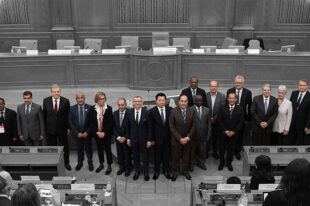Changes Need a Person Behind Them

We must learn how to learn from mistakes and learn boldly. Are our national priorities reflected in the State budget or only in our rhetoric?
Arunas Dulkys, PhD, Auditor General of the Republic of Lithuania

by Arunas Dulkys, PhD, Auditor General of the Republic of Lithuania
State resources are limited, so desiring more than necessities may become threatening. By our nature, we are more likely to see only the positive sides to our expectations. Rarely do we think our fulfilled dreams come with a price paid by someone else. What happens if we take actions without thinking about possible consequences? The consequences of an incorrect desire prompt the emergence of another incorrect action. Unless this process is prevented, adverse consequences begin to grow exponentially.
Lithuania is no exception. With limited resources, a difficult task arises—allocating them in such a way that drives economic growth. Processes that are an end in themselves should not be tolerated. Audits conducted by the Supreme Audit Institution (SAI) of Lithuania reveal a picture where program objectives, goals, measures and criteria financed using State budget funds are often artificially developed. Consequently, the administrative burden is increased, and added value is not created.
In developing an evidence-based, results-oriented public administration system in Lithuania, the intent was to use performance data primarily for performance improvement. Using this data exclusively for reporting has numerous negative effects, such as excessive performance criteria, speculation on criteria values and a goal to simply implement the set requirements rather than tangibly improving results.
In his scientific works, Dr. Norbert Wiener, scientist and forerunner of cybernetics and artificial intelligence theory, signaled that we should only pursue objectives and expect results that are truly necessary (not just appear to be so). Scientific studies on management issues led to the coined phrase “monkey’s paw effect.” The phrase signifies a defect and unpredictability of any process when the expected positive result is accompanied by unintended negative consequences resulting in losses that exceed positive results and, at the same time, devalues them.
The story tells of a family—husband, wife and son—sitting by a cozy fire listening to stories from a friend who has just returned from overseas duty. He shows the family a dried-up monkey’s paw he brought back with him, and it seems that each owner of the mysterious paw is granted three wishes. Though the wishes (and outcomes) remain a mystery, the tale the friend weaves is one of tragedy.
The gripping tale does not deter the father, who pulls the paw from the fire. After his friend leaves, the son departs for work, and, out of curiosity, the father tries his fortune by wishing for money. The father’s wish comes true, as a clerk from the factory where the son works knocks on the door and presents the family with two hundred pounds. The payment—compensation for a factory accident that killed the son.
The mother gets a spontaneous second wish to bring the dead son back. An ominous knock is heard at the door. The father hastily makes a third wish to refuse all wishes as the door opens to find the son standing there—in a horrifying condition caused by the accident.
The paw, a symbol of greed, activated wishes accompanied by terrible consequences stemming from egoistic thoughts. Likened to the hand of public authority and decisions made with its help, the paw beckons that those entrusted to make decisions must continually consider the true consequences.
The signals this story sends are two-fold: developing the courage to learn from mistakes and investing in our public education systems to foster such experiential learning.
We must learn how to learn from mistakes and learn boldly. Are our national priorities reflected in the State budget or only in our rhetoric? Are we able to define, and agree on, what adds value?
Speaking candidly about how we deal with funding education is more important than ever. For more than ten years, learning outcomes in Lithuania have fallen below the average of Organisation for Economic Co-operation and Development (OECD) countries.
The number of schools is decreasing at a slower rate than the number of pupils. Learning outcomes in smaller, rural schools are lower than in larger towns. This further increases the exclusion. Studies on the future of education believe pupils with low learning outcomes pose a potential public burden—most will not be able to live and work independently. They will need maintenance.
Creation of added value has a very positive national effect in terms of solving societal problems, such as emigration and social exclusion. Thus, the first significant step should be clearly and unambiguously identifying such goals. Second, measures aimed at increasing added value should be prioritized. Third, activities of public sector bodies should be focused not on social function and job preservation, but rather on ensuring public service quality is as high as possible.
Such changes need a person behind them. Therefore, providing higher wages to public sector civil servants should be established. Doing so increases the potential to attract highly qualified and motivated employees. It is a very ambitious target.
What’s even more ambitious? Doing only the things that are meaningful. Social sciences often point out the irrationality of human behavior, and the monkey’s paw short story illustrates that distorted expectations lead to negative consequences not caused by an object but by the system in which the characters live.
Fulfilling anything sensible cannot be done through a monkey’s paw, either. It simply finds another host to continue circulating in the market of greed. Does it not remind us of the practice when a latent threat—budgetary governance dried like a monkey’s paw—travels from one political administration to another?
If we asked for two hundred pounds from the State budget without openly, honestly discussing the conditions, perhaps we would, in fact, accept the funds regardless of consequences. Yet, if we cannot agree on what adds value, what moral and fair investment results look like, then a “results-ghost” may come knocking on our door.




